External links
- Northumberland and Durham Family History Society
- "Northumberland and Durham Family History Society, registered charity no. 510538". Charity Commission for England and Wales.
| Formation | 1975 |
|---|---|
| Type | NGO |
| Legal status | Charitable Organization (Education) |
| Purpose | to promote interest in family history, genealogy and heraldry; to foster the spirit of mutual co-operation, by sponsoring projects in these fields |
| Headquarters | Newcastle upon Tyne |
| Location |
|
| Coordinates | 54°58′34″N1°36′37″W / 54.9761°N 1.6104°W Coordinates: 54°58′34″N1°36′37″W / 54.9761°N 1.6104°W |
Region served | North-East of England |
Official language | English |
Main organ | NDFHS Board of Trustees |
| Affiliations | Federation of Family History Societies |
| Website | http://www.ndfhs.org.uk/ |
Northumberland and Durham Family History Society is a family history society that covers Northumberland, Durham, and Tyne and Wear in the North-East of England.
It was created in 1975, and its aims are to "promote interest in family history amongst its members and the general public.
It produces a quarterly Journal, and has a wide range of publications, parish records in particular, for sale.
It is a member of the Federation of Family History Societies.

North East England is one of nine official regions of England at the first level of NUTS for statistical purposes. The region includes the counties of Tyne and Wear, County Durham, Northumberland and a small part of North Yorkshire. Large settlements include the cities of Newcastle upon Tyne, Sunderland and the City of Durham and towns of Gateshead, Darlington, Middlesbrough, Stockton-on-Tees and Hartlepool.
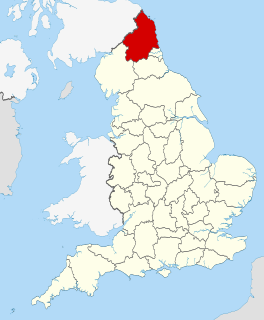
Northumberland is a ceremonial county and historic county in North East England. It is bordered by Cumbria to the west, County Durham and Tyne and Wear to the south and the Scottish Borders to the north. To the east is the North Sea coastline with a path 103 kilometres (64 mi) long. The county town is Alnwick. The county is administered as a unitary authority by Northumberland County Council, headquartered in Morpeth.

Tyne and Wear is a metropolitan county in North East England, situated around the mouths of the rivers Tyne and Wear. It came into existence in 1974 after the passage of the Local Government Act 1972. It consists of the five metropolitan boroughs of Newcastle upon Tyne, Gateshead, North Tyneside, South Tyneside and the City of Sunderland. The county is bordered to the north by Northumberland, to the south by County Durham and to the east of the county lies the North Sea. It is the smallest county in North East England by area, but by far the largest in terms of population.

County Durham is a ceremonial county in North East England. The county town is Durham, a cathedral city. During the Middle Ages, the county was an ecclesiastical centre, due largely to the presence, of St Cuthbert's shrine in Durham Cathedral, and the extensive powers granted to the Bishop of Durham as ruler of the County Palatine of Durham.
Baron Ravensworth, of Ravensworth Castle in the County Palatine of Durham and of Eslington Park in the County of Northumberland, is a title in the Peerage of the United Kingdom.
A family history society or genealogical society is a society, often charitable or not-for-profit, that allows member genealogists and family historians to profit from shared knowledge. Large societies often own libraries, sponsor research seminars and foreign trips, and publish journals. Some societies concentrate on a specific niche, such as the family history of a particular geographical area, ethnicity, nationality, or religion. Lineage societies are societies that limit their membership to descendants of a particular person or group of people of historical importance.

Great Lumley is a village in County Durham, England. It is situated south east of Chester-le-Street, near Lumley Castle. It has a population of 3,843, reducing to 3,684 at the 2011 census.

Northumberland Wildlife Trust was established in 1971 to help conserve and protect the wildlife of Northumberland, Newcastle upon Tyne and North Tyneside in the UK. The Trust is a charity, and a member of The Wildlife Trusts partnership.
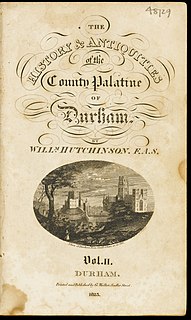
The County Palatine of Durham was an area in the North of England that was controlled by the Bishop of Durham.
Backhouse's Bank of Darlington was founded in 1774 by James Backhouse (1720-1798), a wealthy Quaker flax dresser and linen manufacturer, and his sons Jonathan (1747-1826) and James (1757-1804).
Durham or County Durham was a county constituency in northern England, which elected two Members of Parliament (MPs) to the House of Commons from 1675 until 1832.

Scouting in North East England refers to Scouting in the official region of North East England. It is largely represented by the Scout Association of the United Kingdom and some groups of traditional Scouting, including the Baden-Powell Scouts' Association.
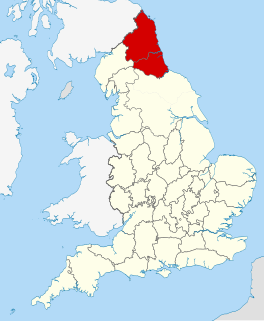
The Northumbrian dialect refers to any of several English language varieties spoken in the historic English region of Northumbria, which includes most of present-day North East England. This may include such varieties as:
The Surtees Society is a text publication society and registered charity based in Durham in northern England. The society was established on 27 May 1834 by James Raine, following the death of the renowned County Durham antiquarian Robert Surtees. Raine and other former friends of Surtees created the society to honour his memory and carry on his legacy, with the focus on publishing documents relating to the region between the River Humber and Firth of Forth in the east and the River Mersey and the River Clyde in the west, the region that had once constituted the kingdom of Northumbria.
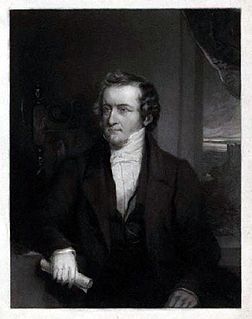
James Raine (1791–1858) was an English antiquarian and topographer. A Church of England clergyman from the 1810s, he held a variety of positions, including librarian to the dean and chapter of Durham and rector of Meldon in Northumberland.
Durham/Northumberland 1 is an English amateur rugby union competition. The league consists of fourteen clubs, and is the seventh tier of the English rugby union system, as one of the 16 regional leagues, though is the highest level of local rugby in the North East of England. The champions are automatically promoted to North 1 East, a division with a wider geographical area that also encompasses the Yorkshire region. The runners-up participate in a play-off against the runners-up from the equivalent regional league, Yorkshire 1, for promotion. The bottom two are relegated to Durham/Northumberland 2.
Captain Sir Thomas Liddell, 1st Baronet (1578–1652) was an English politician, a member of the Liddell family which monopolized the local government of the North of England during the 16th and 17th centuries. He was one of the leading supporters of the Royalist cause in the English Civil War.
The Society of Antiquaries of Newcastle upon Tyne, the oldest provincial antiquarian society in England, was founded in 1813. It is a registered charity under English law.
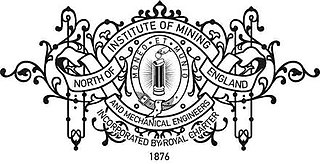
The North of England Institute of Mining and Mechanical Engineers (NEIMME), commonly known as The Mining Institute, is a British Royal Chartered learned society and membership organisation dedicated to advancing science and technology in the North and promoting the research and preservation of knowledge relating to mining and mechanical engineering. The membership of the Institute is elected on the basis of their academic and professional achievements with Members and Fellows entitled to the postnominal MNEIMME and FNEIMME. The Institutes’ membership is predominately from local industry and from academics at Durham and Newcastle Universities, though members are also located further afield across the UK.
The Northumberland Rugby Union is the governing body for rugby union in the county of Northumberland, England and is one of the constituent bodies of the national Rugby Football Union having been formed in 1880. In addition, the county has won the county championship on two occasions, and finished runners-up on a further five occasions.